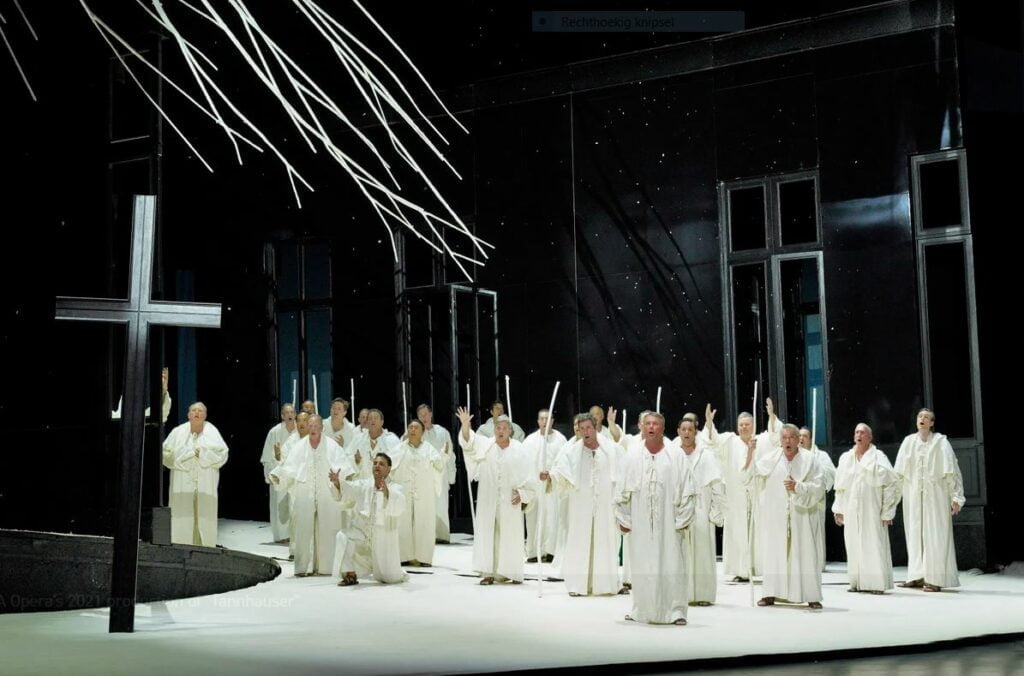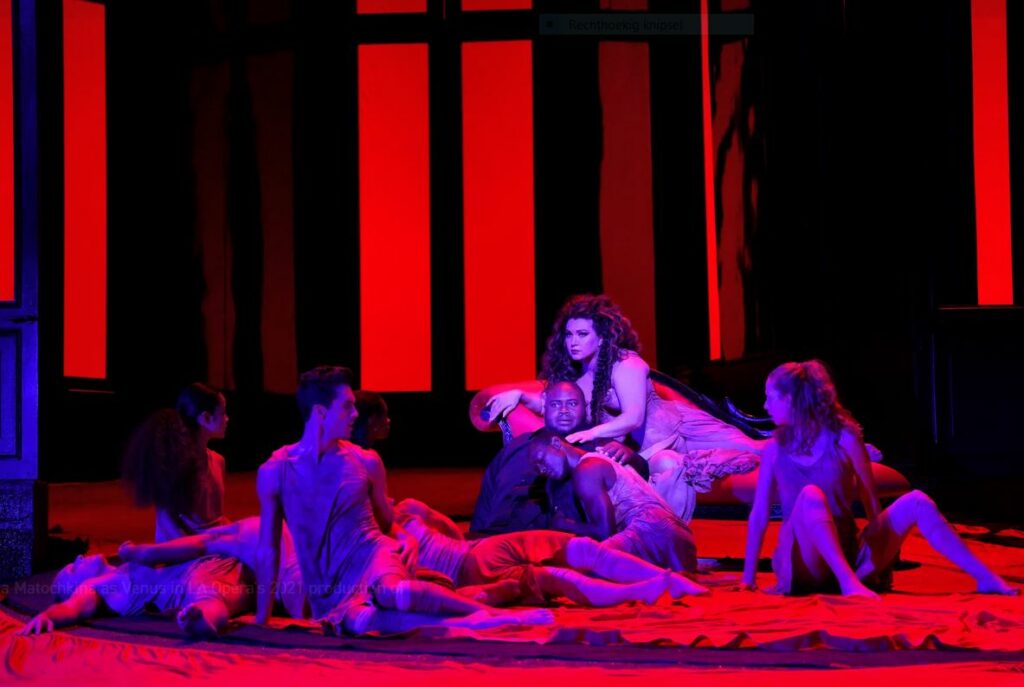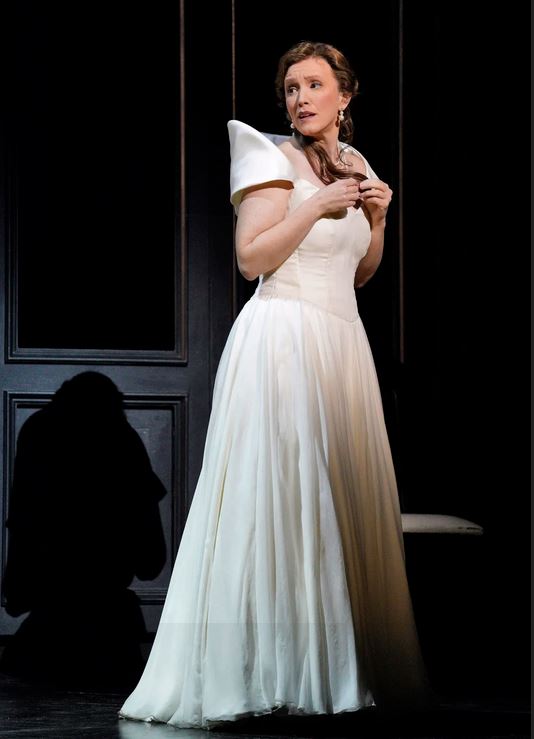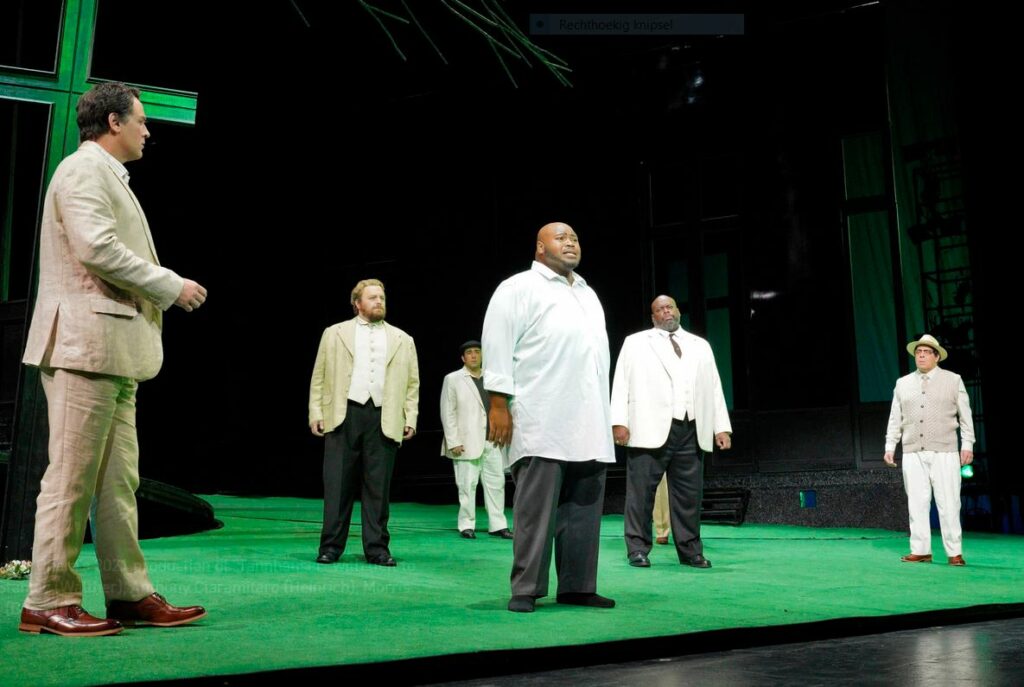TANNHÄUSER
Tannhäuser by Richard Wagner. “Grosse romantische Oper” in three acts. 1845. Libretto by the composer. First performance at the Hoftheater, Dresden, on 19th October 1845.
LA Opera, Wednesday, October 27, 2021. Dorothy Chandler Pavillion.
Tannhäuser: Issachah Savage; Elisabeth: Sara Jakubiak; Venus: Yulia Matochkina; Hermann: Morris Robinson; Wolfram: Lucas Meachem; Biterolf: Philip Cokorinos; Walther von der Vogelweide: Robert Stahley; Heinrich der Schreiber: Anthony Ciaramitaro; Reinmar: Patrick Blackwell; Shepherd: Erica Petrocelli; Conductor: James Conlon; Original production: Ian Judge; Director: Louisa Muller.
Staging: 3***
Music: 4****
When a Wagner opera is performed well nothing can compare with it. Nothing. Not Star Wars or The Avengers or Harry Potter. Neither The Super Bowl, The World Cup, or the Olympics. A good performance of a Wagner opera is the top of the mountain.
LA Opera presented a Tannhäuser that was well cast, well-executed, and well-conceived. The overall effect was overwhelming. All the big moments hit and hit hard. James Conlon and the orchestra were masterful. The chorus, particularly the men’s chorus, was robust yet reverent with magnificent tuning and balance. The principal cast was more than sufficient. The secondary cast might have been the best we have ever heard live or on record.
We can consider Wagner’s oeuvre to consist of three categories. The first category is Der fliegende Holländer, Tannhäuser, and Lohengrin. The second category is Tristan und Isolde, Die Meistersinger, and Parsifal. The Ring Cycle is off by itself in the third category.
The three operas in the first category follow a similar theme. A female character tries to redeem a flawed male character and is destroyed in the process. One might argue that Lohengrin is not a flawed character, but we would argue that his flaw is being over-powered. Lohengrin, therefore, needs to be loved in and of himself as opposed to being adored because of his powerful and impressive heritage.
The theme of the redemptive feminine was prominent in the 19th Century following its most iconic representation at the conclusion of Goethe’s Faust Part 2 which has three divine female spirits interceding for Faust’s redemption. Tannhäuser follows the same pattern with a heavenly Elisabeth interceding for Tannhäuser’s redemption at the conclusion of the drama.

The staging and direction got off to a shaky start in this production. Some of the typical tropes were present during the prelude. Tannhäuser enters early in the music and wanders around the stage as if this is his first time in the space. We find out later that he has been in the Venusberg, the mountain of erotic love, for longer than he can remember so why is he exploring the space?
He spies a grand piano downstage right and is slowly drawn to it. This type of movement is well-executed by dancers. Singers? Not so much. Why there is a piano in the Venusberg is inexplicable. Arriving at the piano, Tannhäuser proceeds to make love to it (?) beginning on the downbeat.
This type of staging must be removed from opera, forever. It’s uncomfortable for the singer and for the audience and it subtracts from the overall experience of the opera. It offers nothing for character, narrative, or setting. It is an idea. It is not an organic extension of the character or the drama. After that unfortunate error, the rest of the opera proceeded naturally with characters acting like human beings instead of vague representations of ill-conceived melodrama.
From a production standpoint, the costuming made no sense. Eventually, Tannhäuser leaves the Venusberg and wakes up in a Thuringian Downton Abbey or a Germanic Room with a View. Wagner set Tannhäuser in the Middle Ages for a specific reason. This is an opera full of Catholic sentiments such as appeals to the Virgin Mary, pilgrimages to Rome, and absolution from the pope. None of these existed in what would have been the Prussian Empire, based on the costuming.
Perhaps the opera world can wake up to the fact that Game of Thrones is still a thing with a new show coming out on HBO. Amazon also has a Lord of the Rings prequel series coming out. Medieval costumes are far from tired and dusty tropes. Setting an opera in a time period other than that intended by its creator is the tired and dusty trope. Opera and Shakespeare are the only idioms in which this practice is rampant. It is as if producers don’t trust the value of opera or Shakespeare in and of themselves.


The set was magnificent even if it also had early 20th Century leanings. Our opinion is that the costumes could have been true to Wagner’s intention and the set could have remained as it was. The set conveyed a strong sense of location, time, and space.
In the secondary cast, two singers stood out. Tenor Robert Stahley was incredible. This is a singer to keep your eye on. We would not be surprised to see him in the role of Tannhäuser in the future. The tone and quality of his voice imply that great things are to come.
The other singer was bass Morris Robinson. Imagine the sound of a tree being split in half. Now imagine that sound being sustained from the top to bottom of a massive voice. That’s Morris Robinson.
Sara Jakubiak performed the role of Elisabeth. She has a sizeable yet attractive voice and that makes her perfect for the role. Interestingly she struggled to produce a consistent tone in the lower register. She has more than enough voice but appeared to be protecting the top of her range by under-singing the bottom.
The title role was performed by Issachah Savage. In the opening scene, we were impressed with the intelligence of his approach. The role of Tannhäuser is a task. It can be considered a Jüngling-Tristan. Savage started the evening by coming off the voice a bit in the top of his range. It created a lyric and pretty sound that was still ample for the house as the orchestration in the first scene with Venus is lighter than the rest of the show. We completely understood that decision from a pacing point of view and it also worked for the character and the setting.
By the time Savage intoned the first of Tannhäuser’s three incantations, “O Königin! Göttin, lass’ mich ziehn!”, he appeared to have abandoned the lyric approach. By the end of the act, he was paying the price for that decision as the voice began to lose some of its shine on the top. The same can be said of the second act. All the notes were there and present but were beginning to sound labored. Savage continued heroically through the third act. All in all, it was a fine performance of a difficult role. How difficult? Even a legend such as Jon Vickers refused to sing it.

Now we come to the role of Wolfram. We first heard Lucas Meacham in the role of Figaro in The Barber of Seville at San Diego Opera in 2012. He immediately became one of our favorite singers. In the role of Wolfram, he was nothing short of miraculous with a tone that was both powerful and tender as required by the role. The consistency of his top notes in comparison to the rest of his range recalls great baritones of the past such as Ettore Bastianini and Leonard Warren. There is no baritonal haze on the top of Meacham’s voice. It is crystal clear and thrilling.
Crystal clear and thrilling are terms that can be applied to the entirely of the musical elements in this production. Maestro Conlon, the orchestra, the chorus, and principal cast gave the opera lovers of Southern California a gift with this performance.
We are grateful.
